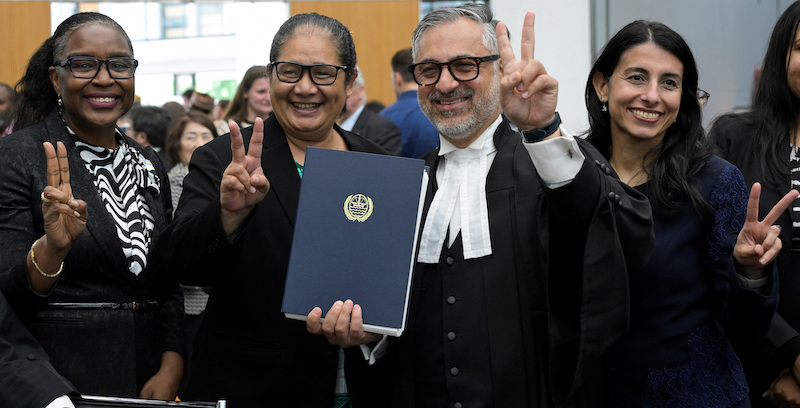Countries need to go beyond their commitments under the Paris Agreement to protect the oceans from the impact of greenhouse gas emissions, a United Nations tribunal on maritime law said on Tuesday.
A coalition of small island nations behind the case hailed the long-awaited legal opinion issued by the International Tribunal for the Law of the Sea (ITLOS) as a “historic” victory.
The court found that greenhouse gas emissions absorbed by oceans can be considered pollutants and states must do whatever they can to reduce them.
The opinion is not legally binding but supporters of the case hope it can help influence climate negotiations and be used as a precedent in future court cases.
Prime Minister Gaston Browne of Antigua and Barbuda said the decision “marks a historic milestone in our collective journey towards environmental justice and climate governance”.
“The ITLOS opinion will inform our future legal and diplomatic work in putting an end to the inaction that has brought us to the brink of an irreversible disaster”, he added.
Landmark case
Antigua and Barbuda is among nine small island states that last year asked Hamburg-based tribunal ITLOS to clarify the state responsibilities on climate change under the UN Convention on the Law of the Sea (UNCLOS).
The 1982 convention has 164 countries as parties, with the notable exception of the United States.
Africa must reap the benefits of its energy transition minerals
The treaty requires its signatories to prevent, reduce and control marine pollution. But it does not explicitly identify greenhouse gas emissions as pollutants, prompting island nations to seek an opinion on whether that would qualify.
They also asked the tribunal to spell out what the countries should do to cut down emissions given their impact on the oceans.
In submissions to the proceedings, most countries acknowledged that greenhouse gas emissions pollute the oceans, but they disagreed on what obligations the maritime treaty imposed on their actions related to climate change.
Polluters pushback
China and India challenged the tribunal’s jurisdiction, arguing that issues relating to climate change should be handled within the UN climate change (UNFCCC) regime.
While accepting the tribunal’s authority to give an opinion on the matter, wealthy nations including the European Union, the United Kingdom, Japan and Australia said the Paris Agreement lays out the rules and procedures necessary to address climate change and comply with the requirements of UNCLOS.
The tribunal’s opinion should not be “imposing more stringent obligations than those already agreed” under the Paris Agreement, the EU statement said.
Azerbaijan pursues clean energy to export more ‘god-given’ gas to Europe
But the tribunal took a different view. It said “complying with the obligations and commitments under the Paris Agreement” would not be enough to satisfy the country’s duty to protect the oceans.
That is because the Paris Agreement does not require countries to reduce greenhouse gas emissions “to any specific level according to a mandatory timeline”, but leaves them freedom to set their own climate goals.
The tribunal’s opinion “confirmed that the obligations under the Paris Agreement set a floor, not a ceiling for states to act to prevent greenhouse gas emissions”, said Tiffanie Chan, Policy Officer at the Grantham Research Institute on Climate Change and the Environment.
Existential threat
One of the planet’s greatest carbon sinks, the ocean absorbs about 25% of all carbon dioxide emitted by human activities and has captured 90% of the excess heat generated by those emissions. Global oceans are experiencing unprecedented heat, with surface temperature records broken every day since March 2023.
For small island states, combatting global warming is a matter of survival. The South Pacific nation of Tuvalu could be completely submerged by the end of the century at current rates of emissions and without extensive measures to adjust to climate change.

Payam Akhavan, lead counsel for the nine island nations, poses with other lawyers after The International Tribunal for the Law of the Sea (ITLOS) gave its advisory opinion. REUTERS/Fabian Bimmer
Eselealofa Apinelu, Tuvalu’s Attorney General, said she had travelled for over 24 hours to reach Hamburg but did not want to miss this “historic moment”.
“We have to do everything that we can to make sure that we can find a solution to our challenges”, she said. “This is an important first step in holding the major polluters accountable, for the sake of all humankind”.
Next steps
Climate lawyers and campaigners said the tribunal’s opinion could influence climate negotiations and push the countries most responsible for the climate crisis to raise their ambition to cut emissions when they submit the next round of national climate plans due in early 2025.
Payam Akhavan, the legal counsel for the nine island nations, said the case was borne out of “frustration with the failure of the COP process” to achieve its objectives. “The turn to international law should simply shape future negotiations to ensure that the climate change regime is more robust and that it has more teeth than it presently does”, he added.
Legal experts are also hoping that the decision could form a significant precedent and influence upcoming legal opinions by the Inter-American Court on Human Rights and the International Court of Justice, which are also considering countries’ climate obligations.
